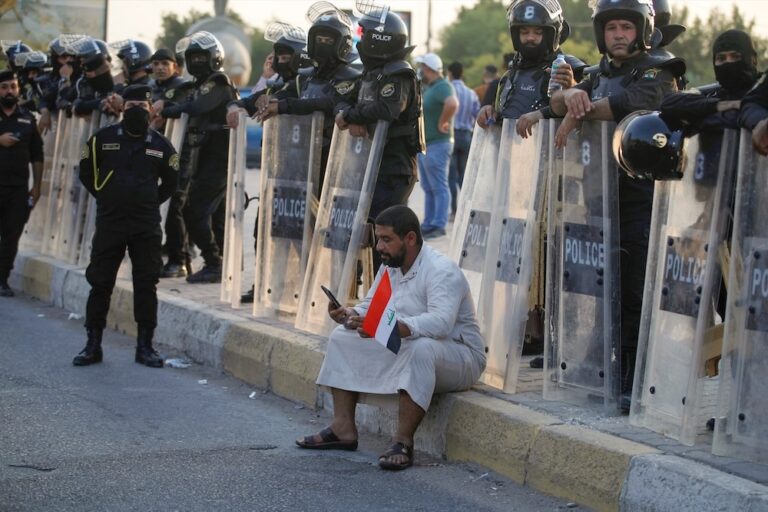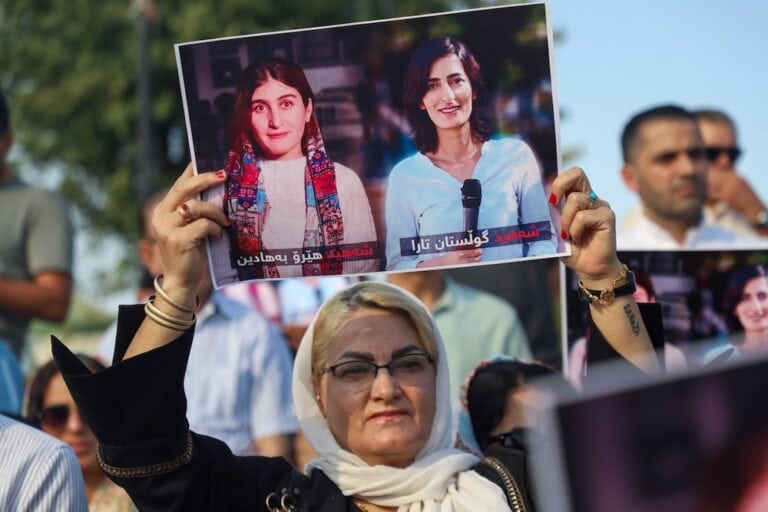(RSF/IFEX) – The following is a 22 July 2003 RSF press release: The Iraqi media three months after the war: a new but fragile freedom Reporters Without Borders called today for clear and coherent laws to replace restrictive media regulations imposed by the US and British forces occupying Iraq. In a report on developments in […]
(RSF/IFEX) – The following is a 22 July 2003 RSF press release:
The Iraqi media three months after the war: a new but fragile freedom
Reporters Without Borders called today for clear and coherent laws to replace restrictive media regulations imposed by the US and British forces occupying Iraq.
In a report on developments in the three months since the US-British takeover of the country, RSF welcomed the vigorous revival of the media after three decades of grim repression under President Saddam Hussein’s regime, but expressed fears that the new freedoms could be eroded if resistance to the occupying forces grows.
RSF also called for the ill-defined powers and structure of the Iraq Media Network (IMN), set up by the US as part of the post-war media, to be rapidly and clearly spelled out.
The press freedom organisation noted that after an especially deadly war for journalists (10 killed, at least 10 wounded and journalists Fred Nérac and Hussein Osman still missing), attacks on the media continue and working conditions in Iraq are still perilous.
The attacks have included: US troops ransacking the Baghdad offices of Al-Adala, the organ of the country’s main Shiite political party; Iraqi police arresting a crew from the pan-Arab TV station Al-Jazeera as they were filming an anti-US demonstration; the point-blank-range shooting death of a freelance British cameraman in central Baghdad; and the killing of the Mosul bureau chief of a Kurdish TV station in an armed clash.
Reporters Without Borders noted that the British army has only begun searching in the past two weeks for traces of Nérac and Osman, who worked for the British TV network ITN, near where they disappeared in southern Iraq on 22 March.
The 3,800-word report, based on a fact-finding mission earlier this month, describes the Iraqi media’s radical transformation since the US capture of Baghdad into a prolific written press in full bloom, with at least 85 different newspapers and magazines. Dozens of once-banned cybercafés have also opened and shops selling satellite TV dishes, which were banned by Saddam Hussein, are doing a roaring trade all over the capital. There is less diversity in the broadcast media, but some radio and TV stations do exist. Coalition forces have set up their own media outlets: an AM and FM radio station, a TV station and a daily newspaper, Al-Sabah, which make up the IMN. The IMN has also taken over from the old information ministry and plans to build up state media outlets.
Journalists told the Reporters Without Borders mission they were still censoring themselves, even though they openly criticise what many call “the occupation forces”. A decree dealing with “inimical media activity” issued in early June by the country’s US civilian administrator, Paul Bremer, bans “incitement to violence against coalition forces”, as well as incitement to “ethnic and religious hatred” – vague terms whose interpretation by the US authorities could be used to crack down on the local media.
General lawlessness also threatens Iraq’s newly-free journalists. Although only the Patriotic Union of Kurdistan and the Kurdish Democratic Party have been allowed to keep their militias, journalists fear reprisals from supporters of other political parties accustomed to settling disputes through violence. Some politicians routinely accuse journalists who criticise them of being “saddamiye” (wanting Saddam Hussein’s return). The messages thought to be from Saddam Hussein that were broadcast recently by Arab satellite TV stations have revived fear of the dictator, who is still very present in people’s minds.
The full report can be read on the Reporters Without Borders website: http://www.rsf.org


